Texas Band of Yaqui Indians
The Texas Band of Yaqui Indians are descendants from a band of Mountain Yaqui Indian fighters from Sonora, Mexico. They are now headquartered in Lubbock, Texas.
{{Multiple issues|
| Regions with significant populations | |
|---|---|
| 393 Texas, 859 Nevada, 583 Arizona, California | |
| Languages | |
| English, Northwestern Mexican Spanish,Cahitan-Yoeme | |
| Religion | |
| Roman Catholicism, indigenous spiritual beliefs , Jehovah Witness | |
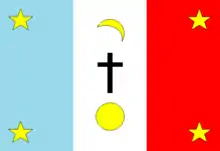
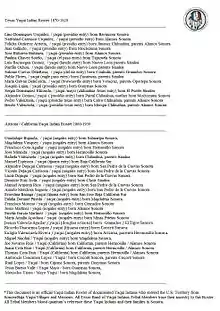
In 2015, the Texas state senate passed a senate bill SR# 989, recognizing them as a state Tribal group, authored by Charles Perry, recognizing the group as Native Americans.[1] The organization is a state-recognized tribe.
Origins
Yaqui were wanted for killing Mexican soldiers in around 1850 and were ultimately chased out of Sonora, Mexico, in 1870. Yaquis had been executed by Mexican firing squads, forcibly deported or enslaved.
Generations later, younger family descendants of Chief Lino, representing ten families, gathered to form the Texas Band of Yaqui Indians forming the very first Texas Yaqui Tribal Council reuniting other Texas Yaquis families (Lujan, Arrietta, Valenzuela, Buitemea, Delarosa/Cuevas, Urquides, Gomez, Flores, Ochoa, Carrasco, Galindo, Galvan) who scattered throughout Texas and New Mexico bringing in original Yaqui families.[2] The Texas Band of Yaquis formed its very first open enrollment for other Yaqui families in the U.S. in need of Native rights who preserved their Yaqui identity. Using online genealogical database records, all Texas Band members have proof of Yaqui Indian ancestry on file dating back to 1700 Sonoran Yaqui Territories.
Mountain Yaquis
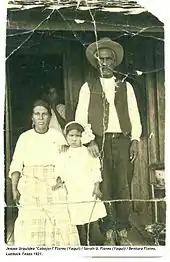

Sierra Yaquis or Mountain Yaquis were different from very well known pueblo or village Yaquis. Mountain Yaquis protected the outer regions of the Hiakim or the Yaqui homelands.[3] They were fierce fighters and warriors who fought against the Mexicans and Americans who came into Yaqui boundary lands in Sonora. Like Comanches and Apaches, they were known to raid villages and farms, taking women, children, livestock and supplies. Nomadic, they would travel in groups from the southwest to northern regions of the US long before Mexico or the US were established.
Weaponry of the Sierra Yaquis was bows and arrows. Spears were often laced with dried poisons from various venomous species. Later after foreign encroachments they changed and adopted firearms. They then in time began to dress like Mexican farmers to not be identified as fighters. Evidence of Mountain Yaquis near Texas was photographed by war photographer Otis Aultman in his collections at the State of Texas Historical Archives [4] Mountain Yaqui fighters prayed to patron saints for protection, especially Our Lady of Guadalupe, for protection from bullets or harm from their enemies. In tribal history, it is said the Mountain Yaquis disappeared after the wars and deportations of the Yaquis and merged with other cultures. The Texas Band of Yaquis held on to their Mountain Yaqui tribal culture and continue to do so within families. There are now over 900 documented tribal members in the states of Texas, Arizona, California and New Mexico.
Texas Band Yaquis
Texas Yaquis are not easily compared to Arizona Yaquis, who are federally recognized and the Pascua Yaqui Tribe, and are different in the sense that the Texas Band Yaquis descend from Mountain Yaqui Military Fighters and not Pueblo Village Yaquis. Texas Band Yaquis were the "warlike" Yaquis like many other Bands that robbed trains and villages. Many disappeared and vanished among other cultures except the Texas Band who remained hidden within families forbidden to speak to outsiders they were Hiaki. Devoted to Our Lady of Guadalupe they are known as the fiercest fighters and the most feared Warriors, the Texas Band descend from the names, Cobajori, Bacasegua, Valenzuela, Bacomea, Usacamea and Tonopomea. After the Treaty of Guadalupe Hidalgo ending the wars in Mexico, The U.S. still had to deal with raiding Indians in Mexico along the U.S. Mexican border of Texas. The Federal Government set aside land for a Texas Indian Reservation specifically for Apaches and Yaquis along with other "unidentified" Indians. The Reservation was never established due to the lack of Indian agents to oversee the Reservation and Chief Lino did not want himself and his band to go to the Reservation to be executed or abused by authorities. Original Texas Band Families observe Standard Catholic observances such as Easter, Saints days, and many others. These observances are usually celebrated by the Texas Band Coyote Dances held at night, inherited from their Military Yaqui descendants and hold homage and devotion to "Our Lady of Guadalupe".
The Texas Band of Yaquis are now based in Lubbock, Texas with support from the Pueblos of Vicam, Vicam Switch, and Loma de Guamuchil Cocorit in Sonora.
Recognition
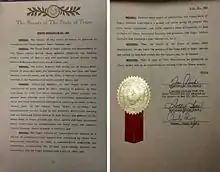
Founders of the Texas Band of Yaqui Indians began a long process of genealogical research to obtain proof of their Yaqui Indian ancestry. The Texas Band obtained original documents tracing back to the Yaqui Territory of 1700.
In 2013, all records and documentation of Yaqui ancestry were submitted to the State of Texas and, on 27 May 2015, the Texas Band of Yaqui Indians was received a congratulatory resolution passed by the Texas State Senate and authored by Charles Perry.[1]
Administration
- Governor, Chairman Iz Ramirez
- Commander, Vice Chairman Sam Sotelo Ramirez
- Captain, Jr. Ramirez
- Captain, Roberto Garcia
- Captain, Joe Hernandez
- Secretary, Lisa Valles
- Treasurer, Vanessa Burleson
- Administrator to the Council, Sylvia Rios
- Administrator to the Council, Jose Camacho
- Administrator to the Council, Chad Mata
- Administrator to the Council, Jose Villegas Sr.
- Attorney, Mia Perez Arroyo
An estimated 1360 people, from California, Arizona, and Texas, are members of the Texas Band of Yaqui Indians.
Yaqui Indians in Chihuahua
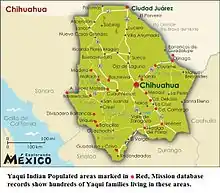
Evidence of Yaqui Indians in the State of Chihuahua are found in online database records in Mexico. They were recorded and documented by the Mormons and include material dating back to the early 1700s.[5]
References
- "SENATE RESOLUTION NO. 989". LegiScan. 27 May 2015. Retrieved 6 September 2018.
- History
- Stories Archived 2015-05-24 at the Wayback Machine
- Mountain Yaqui Fighters
- Yaqui Indian Records
https://capitol.texas.gov/tlodocs/84R/billtext/html/SR00989F.htm
External links
- Texas Band of Yaqui Indians, official website
- Texas Band of Yaqui's Facebook Newsletter,
- State Resolution SR#989
- Yaqui Indigenous People
- Yaqui Nation Link
https://capitol.texas.gov/tlodocs/84R/billtext/html/SR00989F.htm